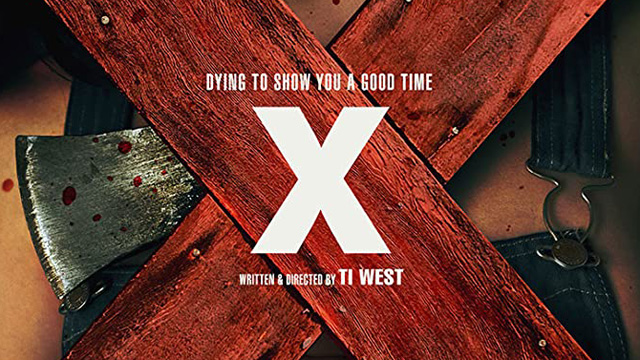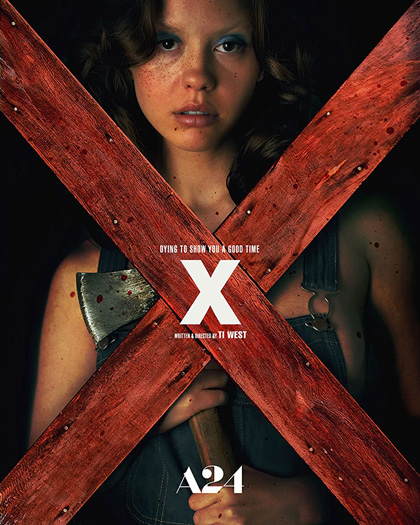

Friday March 25, 2022 | Buckners reviews | Neal
X (2022) – a feature film review by Andrew Buckner
The first horror feature from writer-director Ti West in nearly a decade, X (2022) is a glorious tribute to the daring genre presentations of the 1970’s. It painstakingly replicates this on-screen in every one of its technical facets. This is especially noteworthy in the striking, if too polished cinematography from Eliot Rockett. The latest from West is also an affectionate ode to the can-do spirit of independent moviemaking.
Much of the marvelously mounted structure of the effort, particularly its pacing and cleverly concealed twists, echo Alfred Hitchcock’s quintessential psychological thriller, Psycho (1960). This comparison is also accurate when considering its empathy for and understanding of its antagonist. Still, the plot, setting, characters, and the down-and-dirty feel of the 105-minute exercise are clearly inspired by the Tobe Hooper masterpiece, The Texas Chain Saw Massacre (1974).
The respect X amends for both landmark achievements is palpable and endearing. But this isn’t another case of soulless emulation to win the hearts of nostalgia-driven theater patrons. Even if Psycho is explicitly mentioned near the midpoint of the endeavor, West often slyly alludes to these iconic compositions without ever directly copying their most acclaimed and identifiable attributes. He does this by utilizing singular yet parallel mechanisms to erect an opus that is wholly his own invention. Such is but one of the ingredients which make this layered, ambitious spectacle standout from its usually rote competitors.
West’s vehicle also puts one of the most timeless themes of photographic fright, the deadly consequences of sex, boldly and unflinchingly at the forefront of the creation. This subject is addressed in the visually entertaining manner generally associated with celluloid of this ilk. Regardless, the work, which spends most of the allotted time until the one-hour mark admirably juggling a quietly accruing and unnamed dread and successfully fleshing out its central figures via acts of and discussions on intercourse and cinema, gradually unveils a new perspective on the material. It is one which allows everyone in the affair to be more relatable and sympathetic. This is while, most terrifyingly, generating an uncomfortable mirror towards ourselves.
Taking place in 1979, West tells the tale of a group of six individuals who go to rural Texas to record a pornographic picture entitled The Farmer’s Daughters. It isn’t until they have arrived at their destination that they find out that producer of the microbudget initiative, Wayne (in a magnetic portrayal from Martin Henderson), is intentionally hiding this information from Howard (in an outstanding representation from Stephen Ure). He is one half of the elderly couple who are the hosts of the crew. When Howard’s wife, Pearl (in a phenomenal enactment from Mia Goth that is as effectively scary as it is dramatically gripping), gets a glimpse into what her guests are doing behind closed doors her behavior becomes increasingly strange and unpredictable. It’s not long afterwards that these aspiring artists begin to recognize the fatal outcome of their actions.
This intricate and alluring storyline exemplifies both the familiarity and the refreshing promise of the narrative. Fortunately, in this case, the latter is far more frequently illustrated to spectators. This is due to the ardent and skillfully superb behind the lens guidance West displays in the project. His confidence in his craftsmanship is as perceptible in the tense, resourceful, and wildly engaging concluding forty-five minutes, where slasher style elements take full command of the piece, as it is in the comparatively calmer episodes beforehand.
These overall qualities are also a courtesy of his cerebral and incessantly believable screenplay for the demonstration. The article is filled with graceful, organic development of the leads of the venture. It consistently implements dialogue that is crisp, believable, and occasionally peppered with a flavorful pinch of wonderfully dark humor. Correspondingly, the production has one of the most unforgettable and brilliantly self-referential final lines in recent memory.
There are also many chances taken in both the penning and the maneuvering of the exhibition from West. For instance, there is an impromptu performance of “Landslide” (1975) by Fleetwood Mac near the end of the initial half of the attempt. This could’ve come across as filler in less competent hands. Nonetheless, West uses it as an opportunity to add a dimension of intimate beauty and to deepen the human connective tissue of the proceedings before the account fully evolves into terror.
These strengths are illuminated by a pitch-perfect cast. Goth is mesmerizing as Maxine. Jenna Ortega is just as compelling as the introverted Lorraine. The respective depictions from Brittany Snow as Bobby-Lynne and rapper Kid Cudi as Jackson are just as significant. Simon Prast is just as good in his brief enactment as a local televangelist.
Sharply edited by David Kashevaroff and West and incorporating mood-drenched music from Tyler Bates and Chelsea Wolfe, the undertaking is a triumph of makeup and gore effects. An example of the former is found in Goth’s seamless transformation into the aging Pearl. The latter is uncovered in the creative and pleasant in number kills portrayed in the outing. It is also evident via the plentiful and convincing ick attached to said component. Moreover, the era-appropriate costume and set design are remarkable. These items enhance the meticulous attention to detail attached to the fabrication.
Boosted by a post-credits sequence that is as distinct and satisfying as the enterprise itself, the A24-distributed X is a rarity among mainstream fare. It proudly reverberates the graphic delights and risk-taking, think-outside-the-Hollywood-box abilities of a beloved grindhouse flick. In turn, it is bloody, brutal, atmospheric, and incredibly fun throughout the entirety of the runtime. Nevertheless, the construction has an underlying sensitivity that is just as uncommon. This helps mold the oeuvre into an instant classic. Not only is it also one of the best films of the year so far, but it also continues to cement West as a modern master of old-fashioned apprehension. Judging from the audible reactions that erupted from the audience I saw the show with I’m not alone in this sensation.
X receives ****1/2 out of ***** on The Buckner Scale.